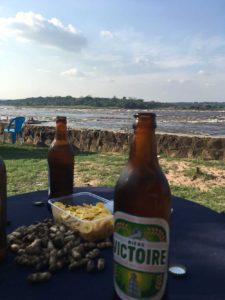 We sat in plastic chairs on a grassy hillside leading down to a low stone wall. Just beyond it, the awesome rapids of the Congo River ripped past, daring anyone to put a foot in the water. The sun was setting, and the air was just beginning to approach a livable temperature. It was a relaxing evening at Chez Tintin.
We sat in plastic chairs on a grassy hillside leading down to a low stone wall. Just beyond it, the awesome rapids of the Congo River ripped past, daring anyone to put a foot in the water. The sun was setting, and the air was just beginning to approach a livable temperature. It was a relaxing evening at Chez Tintin.
The café, named for the iconic comic book series by Belgian artist Hergé, comprises a distillation of all that most profoundly affected me during my visit to Kinshasa. It’s been in the same spot by the river for decades, gradually decaying along with the colonial values it represents. Today, as the plaster statue of Tintin himself crumbles by the entrance, Chez Tintin incorporates its Belgian-occupation roots into Congolese culture for an experience unique to Kinshasa.
I sat at one of the outdoor tables with my mom and her friend. We ordered beers in glass bottles to nurse in the humidity and peanuts charred over an open flame as a snack. As usual in Congo, we were aware of ourselves as the only white faces in the place, immediately recognizable as outsiders. We were also aware of what our whiteness might represent: a painful history of colonization and oppression at the hands of ruthless Europeans. The fallout of subjugation was visible all around us, in the desperation on beggars’ faces, in the numerous hustles that poverty demands many Kinshasans adopt. Down the hill from our table, two young boys leaped onto the low wall and performed acrobatics for small change, risking their bodies flipping off of each other’s backs over a sheer drop to the rocky shores of the river.
For all that they suffer, however, the people of Kinshasa maintain a whip-crack sense of dark humor. The Congolese attitude to oppression seems to be to laugh to keep from crying, and the worse their living conditions get, the funnier the joke becomes. I’ve never witnessed people more attenuated to some kind of cosmic absurdity, and not in a way that’s pedantic or depressing—Congolese humor is funny.
When I say we were the only white faces at Chez Tintin, that isn’t really true. A comedy duo patrolled the outdoor seating in full whiteface and European costume, raising a laugh from every table they stopped at, not to mention some spare coins. When they arrived at our table, the comedians looked at each other in mock surprise, more people like us! One comedian asked the other in French, “do you know what these people do?” And without a moment’s pause, his partner responded “they really help brighten up the place!” Chez Tintin erupted in laughter, the hardest coming from our table.
Pain and elation make up the double-edged sword of my experience in Kinshasa. It was difficult to witness the decay and the historical debris that contribute to much war and suffering—I can only imagine the intensity of living in it. But the strife breeds resilience, a sense of humor essential among the tools used by people who always bounce back. In Kinshasa, I saw some of the lowest troughs of human experience, of poverty, addiction, and death. But I also saw some of the highest peaks, of tightly woven communities and families, of friends sharing laughs by the banks of the river. If I took away anything from the trip, it was that we simply need to carry on, despite everything. Because, as the comedians at Chez Tintin seemed to suggest, what other choice do we have?
By Niccolo Bechtler

